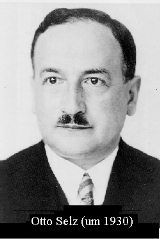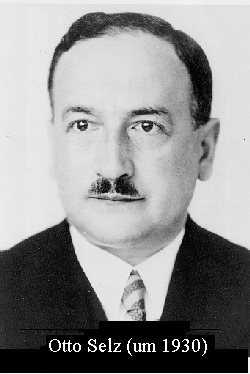
Otto Selz
Encyclopedia

Germany
Germany , officially the Federal Republic of Germany , is a federal parliamentary republic in Europe. The country consists of 16 states while the capital and largest city is Berlin. Germany covers an area of 357,021 km2 and has a largely temperate seasonal climate...
psychologist
Psychologist
Psychologist is a professional or academic title used by individuals who are either:* Clinical professionals who work with patients in a variety of therapeutic contexts .* Scientists conducting psychological research or teaching psychology in a college...
from Munich
Munich
Munich The city's motto is "" . Before 2006, it was "Weltstadt mit Herz" . Its native name, , is derived from the Old High German Munichen, meaning "by the monks' place". The city's name derives from the monks of the Benedictine order who founded the city; hence the monk depicted on the city's coat...
, Bavaria
Kingdom of Bavaria
The Kingdom of Bavaria was a German state that existed from 1806 to 1918. The Bavarian Elector Maximilian IV Joseph of the House of Wittelsbach became the first King of Bavaria in 1806 as Maximilian I Joseph. The monarchy would remain held by the Wittelsbachs until the kingdom's dissolution in 1918...
, who formulated the first nonassociationist
Association (psychology)
In psychology and marketing, two concepts or stimuli are associated when the experience of one leads to the effects of another, due to repeated pairing. This is sometimes called Pavlovian association for Ivan Pavlov's pioneering of classical conditioning....
theory of thinking, in 1913. Selz used the method of introspection
Introspection
Introspection is the self-observation and reporting of conscious inner thoughts, desires and sensations. It is a conscious and purposive process relying on thinking, reasoning, and examining one's own thoughts, feelings, and, in more spiritual cases, one's soul...
, but unlike his predecessors, his theory developed without the use of images and associations. Wilhelm Wundt
Wilhelm Wundt
Wilhelm Maximilian Wundt was a German physician, psychologist, physiologist, philosopher, and professor, known today as one of the founding figures of modern psychology. He is widely regarded as the "father of experimental psychology"...
used the method of introspection in the 1880s, but thought that higher-level mental
Mind
The concept of mind is understood in many different ways by many different traditions, ranging from panpsychism and animism to traditional and organized religious views, as well as secular and materialist philosophies. Most agree that minds are constituted by conscious experience and intelligent...
processes could not be studied in the scientific laboratory.
Selz's ideas anticipated some major concepts in modern cognitive psychology
Cognitive psychology
Cognitive psychology is a subdiscipline of psychology exploring internal mental processes.It is the study of how people perceive, remember, think, speak, and solve problems.Cognitive psychology differs from previous psychological approaches in two key ways....
, including the following:
- The unit of thought is the directed association.
- Understanding a problem involves forming a structure.
- Solving a problem involves testing for conditions.
Selz was an associate professor of legal philosophy at the University of Bonn
University of Bonn
The University of Bonn is a public research university located in Bonn, Germany. Founded in its present form in 1818, as the linear successor of earlier academic institutions, the University of Bonn is today one of the leading universities in Germany. The University of Bonn offers a large number...
, 1921-1923. From 1923 to 1933, Selz was a full professor of philosophy
Philosophy
Philosophy is the study of general and fundamental problems, such as those connected with existence, knowledge, values, reason, mind, and language. Philosophy is distinguished from other ways of addressing such problems by its critical, generally systematic approach and its reliance on rational...
, psychology
Psychology
Psychology is the study of the mind and behavior. Its immediate goal is to understand individuals and groups by both establishing general principles and researching specific cases. For many, the ultimate goal of psychology is to benefit society...
, and pedagogy
Pedagogy
Pedagogy is the study of being a teacher or the process of teaching. The term generally refers to strategies of instruction, or a style of instruction....
of the Mannheim Business School
Mannheim Business School
Mannheim Business School is the graduate business school of the University of Mannheim. It was founded in 2004 as a university spin-off in order to provide Master of Business Administration , Executive MBA, Master of Accounting and Taxation, open enrollment programs as well as tailored company...
. He also served as the Rector of the Graduate School of Mannheim
University of Mannheim
The University of Mannheim is one of the younger German universities. It offers Bachelor, Master, and PhD degrees.The University is mainly located in Mannheim’s palace the largest baroque palace in Germany. The whole city center of Mannheim is aligned symmetrically to the palace.About 800 scholars...
, 1929-1930. Selz's career was shortened by Nazi
Nazism
Nazism, the common short form name of National Socialism was the ideology and practice of the Nazi Party and of Nazi Germany...
policies in Europe, which banned him from his profession in Germany because he was Jewish. In 1938, he was imprisoned in Dachau concentration camp, but was released after five weeks. In 1939, Selz emigrated to the Netherlands
Netherlands
The Netherlands is a constituent country of the Kingdom of the Netherlands, located mainly in North-West Europe and with several islands in the Caribbean. Mainland Netherlands borders the North Sea to the north and west, Belgium to the south, and Germany to the east, and shares maritime borders...
, teaching and researching (sometimes unofficially) in Amsterdam
Amsterdam
Amsterdam is the largest city and the capital of the Netherlands. The current position of Amsterdam as capital city of the Kingdom of the Netherlands is governed by the constitution of August 24, 1815 and its successors. Amsterdam has a population of 783,364 within city limits, an urban population...
until 1943. On July 24, 1943, he was arrested and detained in Westerbork concentration camp. A month later on August 24, he was transported to Auschwitz concentration camp
Auschwitz concentration camp
Concentration camp Auschwitz was a network of Nazi concentration and extermination camps built and operated by the Third Reich in Polish areas annexed by Nazi Germany during World War II...
. Three days later, on August 27, 1943, Selz died in the vicinity of Auschwitz.
Until recently, his works were largely untranslated from German into English.
In 2004, philosopher and psychologist Michel ter Hark, University of Groningen
University of Groningen
The University of Groningen , located in the city of Groningen, was founded in 1614. It is one of the oldest universities in the Netherlands as well as one of its largest. Since its inception more than 100,000 students have graduated...
, published a book called Popper, Otto Selz and the Rise of Evolutionary Epistemology, in which he argues that Karl Popper
Karl Popper
Sir Karl Raimund Popper, CH FRS FBA was an Austro-British philosopher and a professor at the London School of Economics...
got part of his ideas from Selz. Selz himself never published these ideas, partly because of the rise of Nazism which forced him to quit his work in 1933, and the prohibition of referencing to Selz' work.
Works (in German)
- 1910: "Die psychologische Erkenntnistheorie und das Transzendenzproblem" ("The psychological theory of knowledge and the problem of transcendence"). Archiv fur die gesamte Psychologie 16, 1–110.
- 1913: Über die Gesetze des geordneten Denkverlaufes. Eine experimentelle Untersuchung (On the laws of the orderly thought process. An experimental investigation). Speemann, Stuttgart.
- 1919: (with W. Benary, A. KronfeldArthur KronfeldArthur Kronfeld was a German Psychiatrist.-1933 - 1941: Suppression and exile :...
and E. Stern) Untersuchungen über die psychische Eignung zum Flugdienst (Studies on the psychological fitness for flight duty). Schriften zur Psychologie der Berufseignung und des Wirtschaftslebens, Heft 8. Barth, Leipzig. - 1922: Zur Psychologie der produktiven Denkens und des Irrtums (On the psychology of productive thinking and of error). Cohen, Bonn.
- 1924: Die Gesetze der produktiven und reproduktiven Geistestätigkeit (The laws of the productive and reproductive mental activity). Cohen, Bonn.
- 1991: Wahrnehmungsaufbau und Denkprozeß (Perceptual system and thought process). Selected writings, edited by A. Métraux and T. Hermann. Huber, Bern. ISBN 3-456-81941-2.
Further reading
- Ter Hark, Michel. (2004). Popper, Otto Selz and the rise of evolutionary epistemology. Cambridge: Cambridge University Press.
- Ter Hark, Michel. (2010). The Psychology of Thinking Before the Cognitive Revolution: Otto Selz on Problems, Schemas, and Creativity. History of Psychology, 13(1), 2–24.
- Mayer, R.E. (1992). Thinking, problem solving, cognition. New York: W.H. Freeman and Company.
External links
- Bio of Otto Selz at the University of MannheimUniversity of MannheimThe University of Mannheim is one of the younger German universities. It offers Bachelor, Master, and PhD degrees.The University is mainly located in Mannheim’s palace the largest baroque palace in Germany. The whole city center of Mannheim is aligned symmetrically to the palace.About 800 scholars...
(in German).

